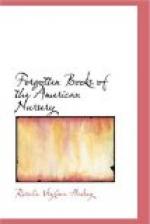“Great A, B and C
And tumble down D,
The Cat’s a blind buff,
And she cannot see.”
Next in order are four fables with morals (written in the guise of letters), for in Newbery’s books and in those of a much later period, we feel, as Mr. Welsh writes, a “strong determination on the part of the authors to place the moral plainly in sight and to point steadily to it.” Pictures also take a leading part in this effort to inculcate good behaviour; thus Good Children are portrayed in cuts, which accompany the directions for attaining perfection. Proverbs, having been hitherto introduced into school-books, appear again quite naturally in this source of diversion, which closes—at least in the American edition—with sixty-three “Rules for Behaviour.” These rules include those suitable for various occasions, such as “At the Meeting-House,” “Home,” “The Table,” “In Company,” and “When abroad with other Children.” To-day, when many such rules are as obsolete as the tiny pages themselves, this chapter affords many glimpses of the customs and etiquette of the old-fashioned child’s life. Such a direction as “Be not hasty to run out of Meeting-House when Worship is ended, as if thou weary of being there” (probably an American adaptation of the English original), recalls the well-filled colonial meeting-house, where weary children sat for hours on high seats, with dangling legs, or screwed their small bodies in vain efforts to touch the floor. Again we can see the anxious mothers, when, after the long sermon was brought to a close, they put restraining hands upon the little ones, lest they, in haste to be gone, should forget this admonition. The formalism of the time is suggested in this request, “Make a Bow always when come Home, and be instantly uncovered,” for the ceremony of polite manners in these bustling days has so much relaxed that the modern boy does all that is required if he remembers to be “instantly uncovered when come Home.” Among the numerous other requirements only one more may be cited—a rule which reveals the table manners of polite society in its requisite for genteel conduct: “Throw not anything under the Table. Pick not thy teeth at the Table, unless holding thy Napkin before thy mouth with thine other Hand.” With such an array of intellectual and moral contents, the little “Pocket-Book” may appear to-day to be almost anything except an amusement book. Yet this was the phase that the English play-book first assumed, and it must not be forgotten that English prose fiction was only then coming into existence, except such germs as are found in the character sketches in the “Spectator” and in the cleverly told incidents by Defoe.




